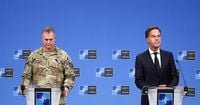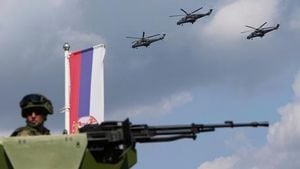In a dramatic escalation of tensions on NATO’s eastern frontier, at least 19 Russian drones violated Polish airspace on September 10, 2025—an incident that has galvanized the Western alliance into launching a robust new military operation. The initiative, dubbed Eastern Sentry, was unveiled by NATO Secretary General Mark Rutte at a press conference in Brussels on September 12, amid mounting anxiety about Russian intentions in the region.
The move comes after Polish and other NATO forces shot down several of the intruding drones, marking the first time since Russia’s 2022 invasion of Ukraine that the alliance has taken such direct military action in response to Russian provocations. According to Reuters, Rutte did not mince words, describing the drone incursions as “reckless and unacceptable.” He stressed, “Whether it was intentional or not, it is unacceptable. The allies have expressed full solidarity with Poland. It is crucial to counter aggression and defend every member of the Alliance.”
Eastern Sentry, as outlined by Rutte and NATO’s Supreme Allied Commander Europe, U.S. Air Force General Alexus Grynkewich, is designed to be a flexible and integrated operation. “We must, as NATO, make clear our resolve and our ability to defend our territory, and that is exactly what Eastern Sentry is designed to do,” Rutte declared. The operation will involve an array of military assets from Denmark, France, the United Kingdom, Germany, and others, with activities set to begin in the coming days and to continue for an undisclosed period.
Among the reinforcements, NATO detailed two Danish F-16 fighter jets, a Danish frigate, three French Rafale jets, and four German Eurofighter jets. Grynkewich explained that the focus is not just on static deployments but on “constantly adjust[ing] and chang[ing] our posture in a manner that keeps the adversary off guard, but also responds to specific threats as we see them emerging.” The eastern flank, stretching from the Baltic states in the north to Romania and Bulgaria in the south, will see a more dynamic defense posture than ever before.
The response from Western leaders has been swift and resolute. French President Emmanuel Macron was unequivocal: “The security of the European continent is our top priority. We will not yield to Russia’s growing intimidation.” At an emergency United Nations Security Council meeting, acting U.S. Ambassador Dorothy Shea reinforced American commitment, stating, “The United States stands by our NATO allies in the face of these alarming airspace violations… and rest assured, we will defend every inch of NATO territory.”
Polish officials, for their part, have rejected Moscow’s claim that the drone incursions were accidental. Prime Minister Donald Tusk, in a pointed rebuke to suggestions from former U.S. President Donald Trump that the incident may have been a mistake, wrote, “We would also wish that the drone attack on Poland was a mistake. But it wasn’t. And we know it.” Polish Foreign Minister Radislaw Sikorski, speaking to Reuters in Kyiv, called for a stronger U.S. stance: “We hope the United States will join other allies in solidarity.”
The U.S. response has so far been one of strong rhetorical support. U.S. Secretary of Defense Pete Hegseth, in a conversation with Polish Deputy Prime Minister and Defence Minister Władysław Kosiniak-Kamysz, assured that “Poland can count on the friendship and full allied support of the United States,” as reported by Kosiniak-Kamysz on social media. However, some analysts, such as former NATO spokeswoman Oana Lungescu, have noted the absence of a direct American military role, observing that so far, “we’ve seen Europeans operating US platforms without a direct American military role.” Still, she emphasized the gravity of the situation, noting that a joint news conference by the NATO secretary-general and the supreme allied commander is “very rare.”
Britain, meanwhile, has moved beyond military maneuvers to economic measures. On September 12, British authorities announced new sanctions targeting Russian oil revenue and entities involved in supporting Russia’s war effort. The list included bans on 70 vessels believed to be part of Russia’s so-called “shadow fleet” used to transport oil in defiance of Western sanctions, as well as restrictions on dozens of individuals and companies supplying Russia with weapons-related materials. British Foreign Secretary Yvette Cooper, who visited Kyiv on September 12, was blunt: “The U.K. will not stand idly by as Putin continues his barbaric invasion of Ukraine,” and condemned what she called Putin’s “complete disregard for sovereignty” by launching drones into NATO airspace.
Russia, for its part, has denied responsibility for the drone violations. Kremlin spokesman Dmitry Peskov insisted on September 12 that Russian forces had not intended to hit any targets in Poland, and that talks to end the war in Ukraine were on “pause.” He added, “One cannot simply put on rose-tinted glasses and expect that the negotiation process will yield lightning-fast results.”
The incident has also reignited debate within NATO about the balance between defending alliance territory and supporting Ukraine. Jamie Shea, a former top NATO official now at Chatham House, told the Associated Press that Russian President Vladimir Putin may be seeking to force Western allies to “make the choice between defending NATO and defending Ukraine.” From Putin’s perspective, if NATO cannot do both, it could allow Russia to further damage Ukraine’s energy infrastructure, “causing misery for the Ukrainian population.”
Despite the uncertainty and the shifting ground, NATO officials have sought to reassure member states, especially those on the eastern flank. “Poland and citizens from across the alliance should be assured by our rapid response earlier this week and our significant announcement here today,” General Grynkewich said. The alliance already maintains thousands of troops in Eastern Europe, but the new operation signals a willingness to adapt rapidly to emerging threats.
As Eastern Sentry prepares to launch, the message from Brussels is clear: NATO intends to defend its borders with renewed determination, and any further violations—intentional or otherwise—will be met with a swift and united response.




